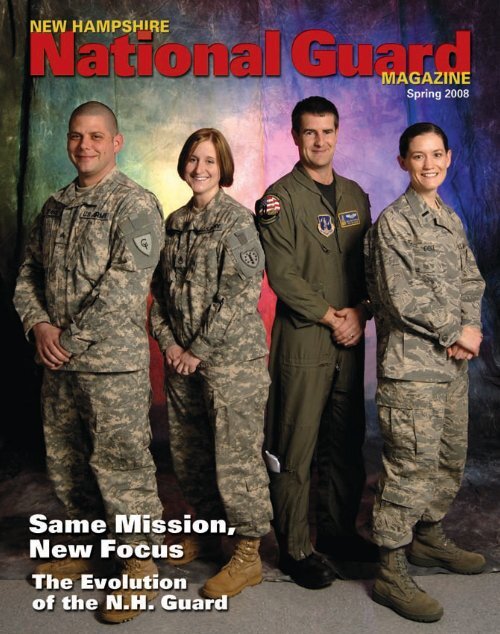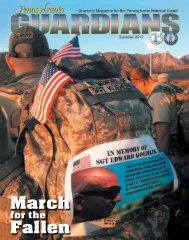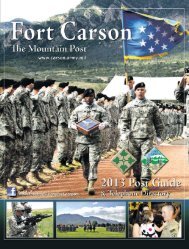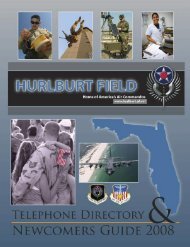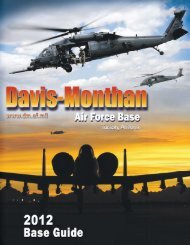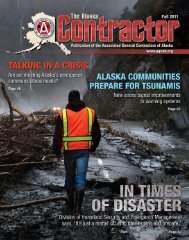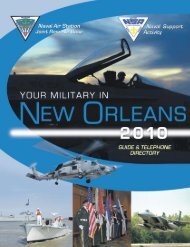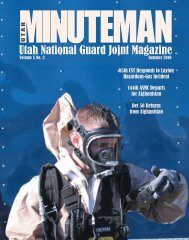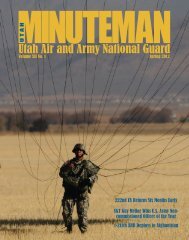New Hampshire National Guard Magazine - Spring 2008 - Keep Trees
New Hampshire National Guard Magazine - Spring 2008 - Keep Trees
New Hampshire National Guard Magazine - Spring 2008 - Keep Trees
You also want an ePaper? Increase the reach of your titles
YUMPU automatically turns print PDFs into web optimized ePapers that Google loves.
Governor John Lynch<br />
<strong>New</strong> <strong>Hampshire</strong><br />
Major General Kenneth Clark<br />
Adjutant General of the<br />
N.H. <strong>National</strong> <strong>Guard</strong><br />
Brigadier General Stephen Burritt<br />
Commander of the N.H. Army <strong>National</strong> <strong>Guard</strong><br />
Brigadier General Mark Sears<br />
Commander of the N.H. Air <strong>National</strong> <strong>Guard</strong><br />
Major Greg Heilshorn<br />
State Public Affairs Officer, N.H. <strong>National</strong> <strong>Guard</strong><br />
First Sergeant Michael Daigle<br />
Deputy State Public Affairs Officer,<br />
N.H. <strong>National</strong> <strong>Guard</strong><br />
2nd Lieutenant Sherri Pierce<br />
Public Affairs Officer,157th Air Refueling Wing,<br />
N.H. Air <strong>National</strong> <strong>Guard</strong><br />
STAFF<br />
Soldiers of the 114th Mobile Public Affairs<br />
Detachment, N.H. Army <strong>National</strong> <strong>Guard</strong><br />
Airmen of the 157th Air Refueling Wing Public<br />
Affairs Office and Communications Squadron,<br />
N.H. Air <strong>National</strong> <strong>Guard</strong><br />
Bob Ulin<br />
Publisher<br />
Susan Harrington<br />
Editor<br />
Gloria Schein<br />
Art Director<br />
Darrell George<br />
Advertising Sales<br />
Toll Free: (866) 562-9300 • Fax: (907) 562-9311<br />
Web: www.AQPpublishing.com<br />
This unofficial magazine is an authorized publication<br />
for members of the <strong>New</strong> <strong>Hampshire</strong> <strong>National</strong> <strong>Guard</strong>.<br />
Contents of the magazine are not necessarily the official<br />
view of, or endorsed by, the U.S. government, the<br />
Department of Defense, Department of the Army and/or<br />
the Air Force or the <strong>New</strong> <strong>Hampshire</strong> <strong>National</strong> <strong>Guard</strong>. The<br />
appearance of advertising in this publication does not<br />
constitute endorsement by the Department of Army and/or<br />
the Air Force or the Contractor of the firms, products or<br />
services advertised.<br />
All editorial content of the magazine is prepared,<br />
edited, provided by and approved by the Public Affairs<br />
Office of the <strong>New</strong> <strong>Hampshire</strong> <strong>National</strong> <strong>Guard</strong>. The magazine<br />
is printed by AQP Publishing, a private firm, in no way<br />
connected with the Department of the Army and/or the Air<br />
Force, under exclusive written contract with the United<br />
States Property and Fiscal Office for <strong>New</strong> <strong>Hampshire</strong>. AQP<br />
Publishing is responsible for commercial advertising.<br />
Everything advertised in this publication shall be<br />
made available for purchase, use or patronage without<br />
regard to race, color, religion, sex, sexual orientation,<br />
national origin, age, marital status, physical handicap,<br />
political affiliation, or any other non-merit factor<br />
of the purchaser, user or patron. A confirmed violation<br />
of this policy of equal opportunity by an advertiser<br />
shall result in the refusal to print advertising from<br />
that source.<br />
The <strong>New</strong> <strong>Hampshire</strong> <strong>National</strong> <strong>Guard</strong> <strong>Magazine</strong> is a<br />
quarterly, joint publication for the soldiers and airmen<br />
serving in the N.H. <strong>National</strong> <strong>Guard</strong>, as well as retirees<br />
and their families. It is posted to the World Wide Web<br />
at https://www.nh.ngb.army.mil.<br />
The <strong>New</strong> <strong>Hampshire</strong> <strong>National</strong> <strong>Guard</strong> <strong>Magazine</strong> is a<br />
commercial enterprise publication produced in partnership<br />
by the State Public Affairs Office, N.H. <strong>National</strong><br />
<strong>Guard</strong>, 4 Pembroke Road, Concord, NH 03301, phone<br />
(603) 225-1340, fax (603) 227-1508; and AQP Publishing<br />
Inc., 8537 Corbin Drive, Anchorage, AK 99507.<br />
Views and opinions expressed herein are not<br />
necessarily the official views of the departments of the<br />
Army and Air Force, or the State of <strong>New</strong> <strong>Hampshire</strong>. All<br />
Diversity in the N.H. <strong>National</strong> <strong>Guard</strong> . . . 2<br />
It’s more than just a black-white thing<br />
Airman Column . . . . . . . . . . . . . . . . . . . . 6<br />
Soldier Column . . . . . . . . . . . . . . . . . . . . 7<br />
Search & Rescue . . . . . . . . . . . . . . . . . . . . . . . . . . . . . . . . . . . . 9<br />
Not Your Daddy’s <strong>Guard</strong> . . . . . . . . . . . . . . . . . . . . . . . . . . . . . 10<br />
– Transformation brings new<br />
opportunities, challenges to<br />
field artillery community . . . . . . . . 10<br />
– Building a lasting case for Pease . . 11<br />
N.H. Air <strong>Guard</strong> leaders hopeful for new aircraft, missions<br />
SPRING <strong>2008</strong><br />
The base the war almost forgot . . . . . . . . . . . . . . . . . . . . . . . . 14<br />
Embedded Training Team<br />
exceeds expectations at halfway<br />
mark of Afghan deployment. . . . . . . . . . 16<br />
More than 470 join N.H. <strong>National</strong><br />
<strong>Guard</strong> in 2007. . . . . . . . . . . . . . . . . . . . . 18<br />
Ranks grow to highest mark since mid 1990s<br />
Army Promotions & Awards . . . . . . . . . . . . . . . . . . . . . . . . . . 20<br />
Air Promotions & Awards . . . . . . . . . . . . . . . . . . . . . . . . . . . . 20<br />
On the Cover: The next generation of citizen soldiers and airmen: from left, Sgt. Russell Evans of<br />
C Co., 3/238th Aviation; Sgt. Kathryn Stansfield, 54th Troop Command; Capt. Nelson Perron, 157th Air<br />
Refueling Wing; and 1st Lt. Emily Cole, 157th Operations Support Flight.<br />
Photo: Tech. Sgt. Aaron Vezeau, PA Media Center Manager, 157 ARW<br />
https://www.nh.ngb.army.mil<br />
photos are the property of the N.H. <strong>National</strong> <strong>Guard</strong><br />
unless otherwise credited. Circulation: 3,000<br />
How to reach us: We welcome letters to the editor.<br />
They must be signed and include the writer’s full name<br />
and mailing address. Letters will be printed on a first<br />
come, first serve basis.<br />
Submissions: We encourage story and photo<br />
submissions. Please send articles and photos with name<br />
and captions identifying people in photo, phone number,<br />
e-mail and mailing address to:<br />
<strong>New</strong> <strong>Hampshire</strong> <strong>National</strong> <strong>Guard</strong> <strong>Magazine</strong><br />
State Public Affairs Office, N.H. <strong>National</strong> <strong>Guard</strong><br />
4 Pembroke Road • Concord, NH 03301<br />
(603) 225-1340<br />
<strong>Spring</strong> <strong>2008</strong> / <strong>New</strong> <strong>Hampshire</strong> <strong>National</strong> <strong>Guard</strong> <strong>Magazine</strong> 1
A note from the state PAO:<br />
After Staff Sgt. Michelle Lowes sent an e-mail to N.H. <strong>Guard</strong>smen and<br />
employees in February inviting them to an event to celebrate diversity awareness<br />
and the start of Black History month, she received a reply from a soldier who asked<br />
when “White History month” would be held.<br />
Lowes, a black American who works full-time in military personnel, forwarded<br />
his response to her supervisor, who dealt with it swiftly. The soldier was counseled<br />
by his chain of command and then brought to Lowes, presumably to apologize.<br />
“He said, ‘If I had known it was you, I wouldn’t have sent (the e-mail),’”<br />
recalled Lowes, who had never met the soldier before.<br />
The phrase “diversity awareness” seems like an oxymoron when applied to the<br />
N.H. <strong>National</strong> <strong>Guard</strong>. We mirror a state that is 96 percent white, according to the<br />
2000 U.S. Census. Of the remaining 4 percent, Latinos represent 1.7 percent,<br />
Asians 1.3 percent and black or African American .7 percent.<br />
In our organization, the number of different ethnic groups combined represents<br />
about 2.5 percent of our total force, which is just under 2,700 soldiers and airmen.<br />
The soldier’s reply, and his attempt at contrition, was not an isolated case of<br />
ignorance and reflects an insecurity shared by some in our organization who feel<br />
threatened by the idea that minorities, to include women, deserve equal treatment<br />
or view diversity initiatives as special treatment for minorities.<br />
Others believe that the N.H. <strong>National</strong> <strong>Guard</strong> does not have a diversity problem<br />
simply because its membership is an accurate reflection of the state’s population.<br />
That’s exactly why Lowes and Sgt. Luis Cepeda, a Hispanic American, volunteered<br />
to become program managers for their respective cultures. They are part of a<br />
reinvigorated effort by our senior leadership to create an organization that is not<br />
only tolerant, but proactively searching for ways to become more diverse.<br />
For the first time, a diversity council consisting of soldiers and airmen met<br />
this year to address federally mandated requirements that protect seven designated<br />
classes to include Asian Americans, Pacific Islanders, African Americans,<br />
Hispanics, Native Americans, the disabled and women, who represent about 15<br />
percent of the N.H. <strong>National</strong> <strong>Guard</strong>.<br />
NHNG <strong>Magazine</strong> recently spoke with Lowes and Cepeda about their experiences<br />
as minorities in the N.H. <strong>National</strong> <strong>Guard</strong> and how they hope to affect lasting<br />
change in an organization striving to better itself.<br />
2<br />
A Q&A with two of the<br />
organization’s newest<br />
champions of tolerance<br />
NHNG <strong>Magazine</strong>: Why did you volunteer to<br />
manage your respective programs?<br />
Cepeda: It’s my culture and I enjoy doing stuff<br />
to bring out the culture and make people aware of<br />
our accomplishments. In the past, nothing was<br />
done. It was just an e-mail with some information,<br />
so I kind of took charge and said if it’s going to be<br />
done, it should be done right.<br />
Lowes: I volunteered for the same reasons.<br />
It’s an opportunity to educate people outside of<br />
the stereotypical cultures they may have been<br />
exposed to.<br />
NHNG <strong>Magazine</strong>: What do you mean by<br />
“stereotypical cultures?”<br />
Lowes: To give people an understanding of<br />
African Americans and black Americans and so<br />
they can separate what they see on the news. The<br />
faces we see on television are not the best representation<br />
of our culture. They see the bad guys that<br />
get caught. That’s what they see and that’s how<br />
they frame their opinions. They don’t see us in high<br />
ranking positions – it was a dramatic change coming<br />
(to the N.H. <strong>Guard</strong>) from active duty. We have<br />
one black officer here and no Hispanic officers.<br />
I’m in BNOC (basic non-commission officer’s<br />
course) right now and they talk about diversity<br />
and tolerance, but it’s not about who you are in<br />
the truck with. It’s about how you’re going to talk<br />
to the locals.<br />
<strong>New</strong> <strong>Hampshire</strong> <strong>National</strong> <strong>Guard</strong> <strong>Magazine</strong> / <strong>Spring</strong> <strong>2008</strong>
Cepeda: It was an experience for me when I joined here with the<br />
brigade. I was in awe that there were not a lot of different cultures<br />
represented. In Massachusetts, you get everything. That’s one of the<br />
reasons why I wanted to be the manager of the Hispanic program. It’s<br />
more than what you see on TV. We are educated, smart and responsible.<br />
Lowes: People are kind of surprised that you can be smart and all<br />
of those things and be a part of our culture.<br />
NHNG <strong>Magazine</strong>: Being black and Latino have you faced any<br />
specific challenges as both citizens of <strong>New</strong> <strong>Hampshire</strong> and soldiers in<br />
the N.H. <strong>National</strong> <strong>Guard</strong>? Have you encountered racism in either?<br />
Cepeda: When I got out of basic training, my first drill was at Fort<br />
Drum with brigade. I ate alone at the chow hall. I had soldiers actually<br />
walk away from me. Some made comments. One that had my blood<br />
boiling was basically, “I smelled.” He walked away before I could say<br />
anything. That’s when another soldier sat down and asked who I was<br />
and where I was from. He said don’t pay attention to them. That meant<br />
a lot to me. Some people are ignorant. It was an eye opener. I grew up<br />
in Lawrence. Until I came here, it never came up. But you pick your<br />
battles. Being in <strong>New</strong> <strong>Hampshire</strong>, people see things a certain way. The<br />
diversity program will help people look outside the box.<br />
Lowes: In the South, you’re always reminded of who you are and<br />
where your place is. Down south, you have two kinds of racism: in<br />
your face racism and quiet racism where they won’t say it to your<br />
face. Here I have to check. Did they really mean it? Was it a sneak<br />
attack or were they being naive?<br />
Cepeda: Don’t forget the looks.<br />
Lowes: Yeah, the looks.<br />
Cepeda: Shopping or just walking down the street with your<br />
family. Even walking down the street with my 10-year-old daughter<br />
and a lady clutches her purse. You have to laugh. I teach my daughter<br />
that they are the ignorant ones. Everyone is equal. You treat everyone<br />
with respect because that’s how you want to be treated. No matter how<br />
ignorant they are.<br />
Lowes: Right. Don’t give them a reason to continue that stereotype.<br />
I had a lady come all the way down from the other end of an<br />
aisle at the supermarket to get her purse from her carriage.<br />
NHNG <strong>Magazine</strong>: Sgt. Lowes, in your invite to the event to kick<br />
off Black History month, you distinguished between black American<br />
and African American.<br />
Lowes: I make it a point to do that. I did<br />
not earn my citizenship. I have a friend who is<br />
an African-American citizen and she came<br />
from there. I am a black American. I was born<br />
here. It cheapens it to say that we are all<br />
African Americans. My father ingrained that<br />
into us.<br />
NHNG <strong>Magazine</strong>: Sgt. Cepeda, is there a<br />
distinction between Hispanic and Latino?<br />
Cepeda: It does have its differences, but<br />
not from my point of view. A lot of people<br />
take offense if you, for example, call a Puerto<br />
Rican a Mexican. We are all Spanish. But there<br />
are differences. It’s great when people deploy<br />
to Iraq or Afghanistan because you learn there<br />
is more than just white. You meet so many<br />
different people (in the military) from so<br />
many different cultures. You learn from them.<br />
Lowes: I was in charge of someone who<br />
was Asian and I asked why this person wasn’t<br />
coming to drill. I was told she had to take care<br />
of her family and my response was well, I<br />
have to take care of my family too. Well, it<br />
was a different situation. Family means<br />
different things in different cultures.<br />
NHNG <strong>Magazine</strong>: A diversity council was created this month.<br />
That was a first for the N.H. <strong>Guard</strong>.<br />
Lowes: Diversity is not just about blacks and Hispanics. It’s also<br />
includes women and the disabled.<br />
Cepeda: A lot of people heard about the council and want to join.<br />
We’re trying to open everybody’s eyes. It’s a big world out there and<br />
<strong>New</strong> <strong>Hampshire</strong> is a small piece of the world.<br />
Lowes: It’s also a small piece that is getting more diversified.<br />
That’s why it’s important to have this. So we can recruit more women,<br />
more people from different ethnic backgrounds. So they don’t look at<br />
this organization and say, “Oh, they wouldn’t want me.”<br />
NHNG <strong>Magazine</strong>: Because what they see are mostly white males?<br />
Cepeda: I felt the same way.<br />
Lowes: We need to diversify our force so that you can go into a<br />
community and they can see themselves in you. You can say, “Look,<br />
you can be in this uniform,” whether you are black, Asian, Hispanic or<br />
a woman.<br />
NHNG <strong>Magazine</strong>: What made you get past that? That feeling we<br />
were not all inclusive?<br />
Cepeda: It took a while for me to break the ice. You got your<br />
walls up. Your defenses up. You’re in formation and you see that wow,<br />
I am the only Hispanic one here. I felt uncomfortable. It took me<br />
awhile to think, “You know what, he’s my brother – she’s my sister.”<br />
But it took me breaking the ice. No one came to me.<br />
Lowes: I have to say it was the same for me. It was another black<br />
American who approached me, but I also had my head shaved then.<br />
(Laughs.) I got a bad dye job and had to cut off my hair.<br />
NHNG <strong>Magazine</strong>: An important message for the rest of us is to<br />
realize is that it’s almost impossible to understand someone else’s<br />
perspective until you walk a mile in their shoes. What’s the message<br />
you want to get across to the organization, to your fellow soldiers and<br />
airmen, about diversity?<br />
Lowes: It’s not about black or Hispanic. There’s more than that. We<br />
will have plenty of different programs that are coming down – <strong>National</strong><br />
Disability Employment Awareness month, Holocaust Remembrance<br />
Day and Women’s History month. It’s more than just us.❖<br />
Staff Sgt. Michelle Lowes and Sgt. Luis Cepeda talk about the challenges and opportunities of creating a<br />
proactive diversity awareness program in the N.H. <strong>National</strong> <strong>Guard</strong> during an interview in February.<br />
Photo: Staff Sgt. Luke Koladish, State PA Office, N.H. <strong>National</strong> <strong>Guard</strong><br />
<strong>Spring</strong> <strong>2008</strong> / <strong>New</strong> <strong>Hampshire</strong> <strong>National</strong> <strong>Guard</strong> <strong>Magazine</strong> 3
6<br />
Airman Column<br />
She Rocks Our World<br />
Chief Master Sgt. Jackie Page looks back<br />
on three decades of extraordinary service<br />
Editor’s Note: In February, Maj. Gen. Kenneth Clark, the Adjutant General of the<br />
N.H. <strong>National</strong> <strong>Guard</strong>, presented Chief Master Sgt. Jackie Page with the <strong>New</strong><br />
<strong>Hampshire</strong> State Commendation Medal during a special ceremony in the Hall of<br />
Flags at the new Joint Force Headquarters Building.<br />
Every military award is special, but this one is especially significant because it<br />
honors Page’s more than 30 years of service to the N.H. Air <strong>National</strong> <strong>Guard</strong> and the<br />
Joint Force Headquarters, N.H. <strong>National</strong> <strong>Guard</strong>.<br />
The audience, which in addition to Clark, included retired Brig. Gen. Chick Smith<br />
and several colonels, both retired and active, was another indication of how highly<br />
Page is regarded and the extraordinary value she has added to the organization.<br />
“She has been a rock for the N.H. <strong>National</strong> <strong>Guard</strong>,” Clark said. “She is an<br />
institution of knowledge and expertise.”<br />
Typically, such superlatives are expressed at a service member’s retirement, but in<br />
Page’s case, they were just long overdue. We are happy to say that Page is sticking<br />
around awhile longer. She has been the consummate airman and senior enlisted<br />
officer diligently working behind the scenes to take care of the rest of us.<br />
Not surprisingly, she shuns the spotlight, but with a little begging, she agreed to<br />
pen this edition’s Airman Column. We are honored to feature her.<br />
(Continued on page 19)<br />
Chief Master Sgt. Jackie Page receives heartfelt congratulations<br />
from Maj. Gen. Kenneth Clark, the Adjutant General<br />
of the N.H. <strong>National</strong> <strong>Guard</strong>, after he presented her the State<br />
Commendation Medal for more than 30 years of extraordinary<br />
service to the N.H. <strong>National</strong> <strong>Guard</strong>.<br />
Photo: Staff Sgt. Luke Koladish, State PA Office, N.H. <strong>National</strong> <strong>Guard</strong><br />
<strong>New</strong> <strong>Hampshire</strong> <strong>National</strong> <strong>Guard</strong> <strong>Magazine</strong> / <strong>Spring</strong> <strong>2008</strong>
Soldier Column<br />
Traveling the jagged path<br />
From northern Afghanistan, Staff Sgt. Zack Bazzi, a soldier with the N.H.<br />
Army <strong>Guard</strong>’s Embedded Training Team, gives a lesson in “armed social<br />
work.” This is his third deployment. He has served in Bosnia and Iraq.<br />
The morning comes early and cold. The<br />
members of Police Mentor Team (PMT)<br />
Jowsjan move briskly, trying to shake off<br />
the early morning chill. All tasks are accomplished<br />
with the efficiency and speed that<br />
comes with practice and repetition: skilled<br />
gunners mount and load their machine guns,<br />
experienced drivers check their vehicles, and<br />
vehicle commanders turn on a wide variety<br />
of electronics and communications equipment.<br />
Besides the routine jokes and routine<br />
complaints, little else is said – everyone<br />
understands their duty.<br />
When everything is set, the team<br />
commander, Capt. Eric Barricklow, gives the<br />
“mission brief,” answers questions, then<br />
orders our team to mount up.<br />
Our PMT operates in Jowsjan province<br />
in northern Afghanistan. Our mission in a<br />
nutshell is to advise and mentor the Afghan<br />
national police (ANP) in our area of operations<br />
(AO) across five key organizational<br />
systems: operations, training, logistics,<br />
finance and personnel.<br />
We depart our camp heading north.<br />
Our jagged path is covered with potholes<br />
and hugged by hamlets and irrigated fields.<br />
The sites can seem odd for outsiders: little<br />
boys herding sheep, three smiling men and a<br />
goat packed inside the trunk of a moving car,<br />
a donkey blocking our passage, an old man<br />
washing his face with dirty ditch water.<br />
Around here this is normal. It’s us who<br />
are odd.<br />
We reach the main road and turn west<br />
away from the morning sun. Our two-hour<br />
journey is jam packed with history. To our<br />
south, off in the distance, the Hindu Kush<br />
Mountains embrace the sky with powdery<br />
white peaks. The epic range is Afghanistan’s<br />
ultimate paradox. It is the country’s sacred<br />
gift and its dreadful curse: the gift that has<br />
humbled many would-be occupiers, and the<br />
curse that has denied the country true<br />
political unity since time immemorial.<br />
The road we are speeding across used<br />
to ferry Chinese silk to the Middle East and<br />
beyond for hundreds of years. Back then it<br />
was called “The Silk Road.” Now it’s called<br />
Highway 5. To our north is a narrow dessert<br />
that quickly gives way to the Amu Darya.<br />
The legendary river, which in antiquity was<br />
known as the Oxus River, hugs the countries<br />
northern flank, carving its borders with<br />
Turkmenistan, Uzbekistan and Tajikistan<br />
from west to east. The former Soviet states<br />
whose horsemen used to rein terror upon the<br />
northern portions of Afghanistan are more<br />
preoccupied these days with preventing the<br />
terror and instability of Afghanistan from<br />
reining down on their territories.<br />
Our path forward is littered with the<br />
rusting hulls of defeated Soviet tanks, salient<br />
reminders to all “outsiders” that Afghanistan<br />
is easier to invade than to occupy.<br />
We arrive in Sheberghan, the capital of<br />
Jowsjan province and its largest city. At the<br />
police headquarters the captain and I enter<br />
the main building to meet with the Provincial<br />
police chief, General Khalil Aminzada. The<br />
aging general is a shrewd leader, a strong ally<br />
and a trusted friend. He dresses professionally,<br />
and wears a nicely trimmed beard that<br />
hugs his handsome face. His eyes are small<br />
and efficient.<br />
They swiftly locate and lock on their<br />
target and operate with the concentration and<br />
intensity of a man who not only knows how<br />
to decisively wield power over lesser men<br />
but relishes in it.<br />
The meeting with the general sets the<br />
tone of the day.<br />
We discuss logistical challenges, personnel<br />
difficulties, financial troubles, political<br />
dilemmas and tribal disputes. When the<br />
meeting with the general is over, we split up<br />
and visit with the various departments of the<br />
headquarters. My captain is usually jovial and<br />
friendly, and in his role as the commander,<br />
tends to focus on the “big picture.” As for<br />
me, his second in command, I am blunt, fiery<br />
and when need be, confrontational – traits<br />
that come easily for me.<br />
As a well indoctrinated infantry staff<br />
sergeant, details are my life: did the training<br />
officer generate a list of everyone in the<br />
province who needs to attend police basic<br />
training? Is it properly formatted? Did the<br />
logistics officer generate a request for an<br />
increase in monthly fuel allotment for the<br />
province? Is it properly formatted?<br />
(Continued on page 8)<br />
Staff Sgt. Zack Bazzi mingles with a group of Afghan school children. Bazzi is one of 16 <strong>New</strong> <strong>Hampshire</strong><br />
<strong>Guard</strong> soldiers deployed to Afghanistan as part of an embedded training team.<br />
Photo: Courtesy of the <strong>New</strong> <strong>Hampshire</strong> Embedded Training Team<br />
<strong>Spring</strong> <strong>2008</strong> / <strong>New</strong> <strong>Hampshire</strong> <strong>National</strong> <strong>Guard</strong> <strong>Magazine</strong> 7
Traveling the jagged path (Continued from page 7)<br />
The catalog of mundane, yet crucial, questions is a long one.<br />
I spend my meetings flattering and wooing and pressing and bullying<br />
men senior to me in rank, age and experience. I alternate between the<br />
bipolar modes, I crack cheesy jokes, and I impress them with the little<br />
Afghan history that I have learned.<br />
I constantly remind them of my<br />
Arab background and I insist that<br />
that actually makes us blood<br />
brothers. I hold their hands; laugh<br />
at their jokes even when they are<br />
not funny. I tease them. I joke with<br />
them, and when need be, I fall<br />
back on the easiest target of all.<br />
I ruthlessly poke fun at myself.<br />
Noon comes and we break for<br />
lunch. It never changes: goat or<br />
lamb kabobs, rice, “naan” and<br />
Pepsi. The kabobs come on the<br />
skewer and are delicious unless you’re unlucky and it’s the kidney. If<br />
you’re the one who got kidney, then you eat it, act like it’s the best<br />
thing you have ever shoved in your mouth and wonder secretly to<br />
yourself if someone out there will ever appreciate the sacrifices you<br />
have made for your country. The rice is oily, but the raisons, thin slices<br />
of carrot and meat mixed with it, make it tasty and irresistible. The<br />
“naan” is a thick disk of bread and is very filling unless it is cold then<br />
it is better used as a self defense weapon or a hammer. The Pepsi<br />
is a Pepsi.<br />
Lunch is my favorite time of the workday and allows me to freely<br />
partake in my favorite hobbies. While eating and talking with our<br />
hands, and without worrying about any type of table etiquette<br />
8<br />
This is a modern war<br />
(one-dimensional warriors<br />
need not apply).<br />
whatsoever, we enjoy hearty conversations with the general as we all<br />
recount partly exaggerated tales involving many women, much<br />
violence and other supposedly manly deeds.<br />
My favorite anecdote from the general involves a statue of Lenin,<br />
Afghan police officers and women.<br />
The story goes something like<br />
this: during the Russian<br />
occupation, the Russian-backed<br />
government sent a then-promising<br />
Lieutenant Aminzada to study<br />
police work in the motherland<br />
for a year. During one Russian<br />
evening, several young and excited<br />
Afghan men made their way<br />
downtown looking for fun and<br />
women. After hours of fruitless<br />
searching, the men where about<br />
to give up when Lieutenant<br />
Aminzada noticed a statue of Comrade Lenin in the middle of<br />
a square.<br />
The statue depicted a heated Lenin probably giving a fiery speech<br />
about the evils of the capitalist pigs and the goodness of the glorious<br />
proletariat. In the midst of his communist rage, Comrade Lenin raised<br />
his right arm, pointing it forward, in an effort to rally the alienated and<br />
angry masses. Young Aminzada, more interested in matters of the flesh<br />
than in alienated labor, declared to his fellow Afghans, “if we go were<br />
Lenin is pointing, we will find women.” The boisterous bunch<br />
followed Comrade Lenin’s directions.<br />
Lenin never did achieve his utopian vision of a classless society,<br />
but on that particular night, a few lively Afghan cadets who followed<br />
his directions did find something that is perhaps<br />
much more pleasant than fraternal equality.<br />
Half-true, real stories like that make my job<br />
a pleasure.<br />
Our days are spent in smoky rooms talking<br />
endlessly, often in convoluted circles, with rugged<br />
men who have known nothing but poverty and<br />
armed conflict throughout their lives. We compliment,<br />
flatter, praise, pressure, push, pull, confront,<br />
and at times bully our Afghan counterparts into<br />
doing the “right thing.” This is modern war (onedimensional<br />
warriors need not apply); our M-4<br />
Army issue rifles are not our preferred weapons.<br />
Minds and money are the weapons of choice<br />
in this twilight struggle. Counterinsurgency<br />
(COIN) warfare is often referred to in military<br />
circles as the “graduate level of warfare.” In<br />
essence what we do is “armed social work” which<br />
is how it’s described in FM 3-24, the military’s<br />
counterinsurgency field manual.<br />
Our missions so far have involved everything<br />
from the mundane to the dramatic; from building<br />
a bathroom for an elementary school to pressuring,<br />
and angering, a provincial deputy governor into<br />
arresting a vicious warlord. We were successful<br />
with the former, but failed with the latter. Some<br />
types of waste are more difficult to flush down<br />
than others. But we are mission focused and we<br />
are determined to leave Jowjsan province a better<br />
place than we found it. And we will. No doubt<br />
about it. ❖<br />
<strong>New</strong> <strong>Hampshire</strong> <strong>National</strong> <strong>Guard</strong> <strong>Magazine</strong> / <strong>Spring</strong> <strong>2008</strong>
Black Hawk crew faces toughest rescue of their career<br />
during string of extractions in White Mountains<br />
In a span of nine days, Black Hawk crew members from the N.H. Army <strong>Guard</strong>’s 3rd/238th General Support<br />
Aviation Battalion battled some of the fiercest mountain conditions of their careers to assist in three<br />
separate search and rescues in February. From left, Chief Warrant Officer 3 Todd Johnson, 1st Lt. Peter<br />
Cartmel, Staff Sgt. Allan Robinson, and Staff Sgt. Matt Stohrer were among the N.H. <strong>Guard</strong>smen lauded by<br />
state authorities for their expertise and courage. Photo: 1st Sgt. Mike Daigle, State Public Affairs Officer, N.H. <strong>Guard</strong><br />
By Staff Sgt. Luke Koladish, State Public Affairs Office, N.H. <strong>National</strong> <strong>Guard</strong><br />
CONCORD – In a span of nine days in February, the N.H. Army <strong>Guard</strong>’s 3rd/238th<br />
General Support Aviation Battalion battled fierce weather conditions to assist in three separate<br />
rescue operations in the White Mountains. The first proved to be the most challenging flying<br />
of 1st Lt. Peter Cartmell’s 15-year career as an Army aviator.<br />
“It combined some of our riskier maneuvers with night vision goggles, in poor weather,<br />
strong winds and a lot of turbulence,” said Cartmell, who has flown in Bosnia and Iraq.<br />
“Control was very difficult.”<br />
Cartmell said the ever-changing conditions of the White Mountains are a greater challenge<br />
than the consistently poor visibility and threat of enemy contact he faced in Iraq.<br />
The N.H. <strong>National</strong> <strong>Guard</strong> has been supporting <strong>New</strong> <strong>Hampshire</strong> Fish and Game rescue<br />
missions since the 1960’s. On average the aviation unit flies 12 missions a year, most of which<br />
occur during the peak hiking seasons of spring and fall.<br />
On Feb. 11, at approximately 11:30 a.m., <strong>New</strong> <strong>Hampshire</strong> State Army Aviation Officer<br />
Col. Frank Leith received a call that two hikers had gone missing on Mount Lafayette.<br />
The flight crew, composed of Chief Warrant Officer Zachary Lane, Staff Sgt. Matthew<br />
When disaster strikes N.H., we mobilize<br />
Remembering the Blizzard of ‘78<br />
Thirty years ago this February, 468 N.H. <strong>National</strong> <strong>Guard</strong>smen mobilized over a fourday<br />
period during the “Blizzard of 1978.” It dumped more than 30 inches of snow and<br />
left thousands of people stranded on highways and in their homes. Across <strong>New</strong><br />
England, 29 people died and damage was estimated to be $1 billion.<br />
At the time, it was the largest state activation of N.H. citizen soldiers and airmen for a<br />
weather-related emergency since the end of World War II.<br />
“There were heroic acts performed by the police, firefighters, Department of<br />
Public Works, <strong>National</strong> <strong>Guard</strong> and Red Cross,” recalled Charles Pierson of<br />
Barrington in a posting on the Portsmouth Herald’s Web site.<br />
Our predecessors were going door-to-door to assist residents, transporting<br />
stranded motorists, and evacuating Seacoast residents by boat.<br />
Since the blizzard of '78, the N.H. <strong>National</strong> <strong>Guard</strong> has been mobilized for<br />
more than 120 state emergencies to include aerial search and rescues for lost<br />
hikers, injured hikers and escaped prisoners; riot control during Motorcycle<br />
Weekend and at Seabrook's nuclear plant; water shortages; a hospital strike;<br />
a drought; a jet crash; a hostage crisis; an ice storm and eight floods; not to<br />
mention our stellar efforts in the Gulf Coast after Hurricanes Katrina and Rita.<br />
In the last 60 years, more than 10,000 N.H. citizen soldiers and airmen<br />
have answered the call of the governor and state in times of need.<br />
That’s one hell of a legacy – a distinct one.<br />
Stohrer, Staff Sgt. Allan Robinson, and 1st Lt.<br />
peter Cartmell, departed the Army Aviation<br />
Support Facility that afternoon and headed<br />
north to the Fish and Game command post at<br />
the Flume Mountain parking lot.<br />
After nearly three hours of searching, the<br />
crew returned to Concord, only to be called<br />
back into action later that evening. The hikers<br />
had been found on Little Haystack Mountain<br />
and their lives depended on an immediate<br />
extraction.<br />
“With winds gusting up to 65 knots and<br />
freezing fog causing ice buildup on the blades<br />
limiting the aerodynamics, it was the most<br />
extreme mission for a N.H. Army <strong>Guard</strong><br />
search and rescue crew in 20 years,” said<br />
Leith, a Vietnam chopper pilot and veteran of<br />
many search and rescue missions.<br />
When the crew arrived at the extraction<br />
site, the conditions were too turbulent to use<br />
the hoist to extract the hikers. Whether by<br />
luck, or the skill of the search party, the group<br />
was located near a clearing just large enough<br />
to land the UH-60 Black Hawk.<br />
“Trying to land in such a narrow spot with<br />
the tail between two trees keeps you extremely<br />
focused,” Lane said.<br />
The first hiker, James Osborne, 36, of<br />
Manchester, was transported to the Littleton<br />
Hospital. The second hiker, Laurence<br />
Fredrickson, 55, from South Sutton, was<br />
pronounced dead upon arrival at the Littleton<br />
Hospital.<br />
“It takes a tremendous amount of skill,<br />
experience, teamwork, judgment and nerves of<br />
steel to maneuver a helicopter at the top of a<br />
4,800-foot peak with blowing snow and wind<br />
gusts at 30-40 mph or higher, at night, using<br />
night vision goggles,” said Leith. “This crew<br />
performed beyond the call of duty and they<br />
are heroes in my mind.”<br />
Five days later, another crew from the 3rd/<br />
238th GSAB was called. Chief Warrant Officer<br />
Todd Johnson was the pilot in command.<br />
They flew eight Fish and Game officers to<br />
the summit of Mount Lincoln to begin the<br />
search for Benjamin Davis, a Boston law<br />
(Continued on page 19)<br />
A 1980 edition of the N.H. Army<br />
<strong>Guard</strong>’s newsletter featured the<br />
N.H. <strong>Guard</strong>’s activation for an<br />
attempt by more than 2,500 protesters<br />
to shutdown the construction<br />
of Seabrook nuclear<br />
power plant in October of that<br />
year. About 500 citizen soldiers<br />
and airmen were activated to help<br />
local and state authorities thwart<br />
what was called an anarchic<br />
attempt to occupy the plant.<br />
<strong>Spring</strong> <strong>2008</strong> / <strong>New</strong> <strong>Hampshire</strong> <strong>National</strong> <strong>Guard</strong> <strong>Magazine</strong> 9
Transformation<br />
brings new<br />
opportunities,<br />
challenges<br />
to field artillery<br />
community<br />
By Staff Sgt. Luke Koladish,<br />
State Public Affairs Office, N.H. <strong>National</strong> <strong>Guard</strong><br />
On September 8, 2007, most of the <strong>New</strong> <strong>Hampshire</strong> Army<br />
<strong>National</strong> <strong>Guard</strong> stood on a field in Manchester to mark a major<br />
turning point in the structure of our organization. Eight months later<br />
units are simultaneously working to maintain a state of readiness and<br />
cope with the effects of a transformation that created new companies<br />
and merged two field artillery battalions.<br />
In his yearly training guidance, the 197th Fires Brigade (FiB)<br />
commander, Col. David Mercieri, said, “Our country is at war, and<br />
although our task organization and weapon systems may change, we<br />
must ensure that we are prepared to execute our fires and sustainment<br />
mission as well as maintain our warrior skills.”<br />
Along with maintaining the warrior skills, Mercieri set a goal<br />
of 85 percent military occupation skill or MOS qualified by the end<br />
of next year.<br />
“As leaders it is our task and responsibility to train ourselves and<br />
each and every soldier to be ready when the call comes to deploy,”<br />
said Command Sgt. Maj. Robert Stewart, the 197th FiB Command<br />
Sergeant Major.<br />
In addition to the MOS training and warrior tasks, the brigade will<br />
explore a concept new to them, Training and Readiness Oversight<br />
Soldiers from the 1st/172nd Field Artillery conduct military operations on urban<br />
terrain (MOUT) training during annual training last summer. Transformation has<br />
called for new types of training for many N.H. Army <strong>Guard</strong> units.<br />
Photo: 1st Sgt. Mike Daigle, NHNG-PA<br />
10<br />
Soldiers from the 2nd Battalion/197th FA load<br />
artillery ammunition during their annual training<br />
last summer in Val Cartier, Canada. 2007 was the<br />
last year the artillery units were expected to fire<br />
the howitzers. Photo: 1st Sgt. Mike Daigle, NHNG-PA<br />
(TRO). The 42nd Infantry Division, based in <strong>New</strong> York, provides<br />
guidance and can assist in training for the brigade, and in turn the<br />
197th FiB is responsible for the guidance and training of battalions in<br />
Michigan, West Virginia, Rhode Island and Massachusetts.<br />
Within <strong>New</strong> <strong>Hampshire</strong>, two battalions fall under the 197th FiB –<br />
3rd Battalion, 197th Field Artillery and the 3643rd Brigade Support<br />
Battalion (BSB). Soldiers from 1st Battalion, 172nd Field Artillery;<br />
2nd Battalion, 197th Field Artillery; the 744th Transportation Company<br />
and the 3643rd Maintenance Company were absorbed into the<br />
two battalions.<br />
A new company, the 372nd Signal Company, was formed under the<br />
197th FiB. The 47-man unit supplies satellite communications primarily<br />
for the 3/197th FA but trains to support any unit in the organization.<br />
The goal for the first six months for the 3/197th FA was to<br />
re-station its batteries, consolidate with the 1/172nd FA, and ensure<br />
they closed out equipment and completed lateral transfers.<br />
“For the most part it’s been completed, but a few loose ends remain,<br />
such as vault space and locations,” said Capt. Wayne Boutwell, commander<br />
of C Battery, 3/197th FA and the battalion operations officer.<br />
For the average soldier who drills one weekend a month, the most<br />
obvious change has been the departed howitzers. No more preventive<br />
maintenance and checklist service. No more coming into drill and<br />
scraping the rust off the tubes. The guns are gone and field artillery<br />
tasks have ceased.<br />
They have been replaced with Warrior Task Training. Soldiers<br />
have focused on common tasks, incorporating paintball guns for<br />
military operations on urbanized terrain (MOUT) training and preparing<br />
for annual training at Fort Indian Town Gap, Pa.<br />
“They will be focusing on weapons training, MOUT, combat life<br />
saver courses and drivers training,” said Boutwell.<br />
They have been fielding new equipment and communication gear,<br />
but are not scheduled to receive the high mobility rocket system or<br />
HIMARS until May 2009. Until then the battalion will focus on the<br />
new mindset for field artillery.<br />
“We have a whole new personnel alignment. We are going from<br />
11-man gun crews to three,” explained Boutwell. “Instead of being<br />
told exactly what to do, put your gun here, set up here, you are given a<br />
whole area of operations, 3,000 meters by 3,000 meters for three<br />
(Continued on page 12<br />
<strong>New</strong> <strong>Hampshire</strong> <strong>National</strong> <strong>Guard</strong> <strong>Magazine</strong> / <strong>Spring</strong> <strong>2008</strong>
Building a lasting case for Pease<br />
N.H. Air <strong>Guard</strong> leaders hopeful for new aircraft, missions<br />
By 2nd Lt. Sherri Pierce, 157th Air Refueling Wing PAO<br />
NEWINGTON, N.H. – You raise your right hand and swear to<br />
defend your country against all enemies foreign and domestic, but with<br />
continued drawdown in military forces and funding cuts, you wonder<br />
if you will have a military career in 20 years.<br />
Don’t panic. There is a bright future for Pease Air <strong>National</strong><br />
<strong>Guard</strong> Base.<br />
“<strong>New</strong> <strong>Hampshire</strong> is in the right location, based on our proximity<br />
to the ocean, to continue to be a flying unit and do the type of mission<br />
we are now in, which is air refueling and moving equipment, people<br />
and cargo,” said Col. Richard Martell, commander of the 157th Air<br />
Refueling Wing.<br />
Having survived the last Base Realignment and Closure with the<br />
loss of one airplane, N.H. Air <strong>National</strong> <strong>Guard</strong> leaders are actively<br />
seeking new missions in an effort to keep Pease Air <strong>National</strong> <strong>Guard</strong><br />
Base viable and a less-likely target for adverse BRAC action. Two<br />
major initiatives being pursued are active associate and KC-X.<br />
Partnering with our active duty brothers and sisters<br />
With the drawdown of forces, there will need to be a “blending of<br />
active duty, reserve and <strong>Guard</strong> forces to take advantage of limited<br />
resources,” says Martell. “Active associate makes sense.”<br />
The active associate concept is one where active duty members are<br />
assigned to an Air <strong>National</strong> <strong>Guard</strong> Base, such as Pease, much like they<br />
are assigned to an active duty base. For the 157th, that means the wing<br />
is likely to get more aircraft, more pilots and boom operators to crew<br />
those aircraft, and more maintenance personnel to ensure the aircrafts<br />
operability. In addition, the active duty members would live in the area,<br />
contribute to the economy and become members of the community.<br />
“Active duty members are used to having access to many support<br />
services found at an active Air Force base, like a commissary, Base<br />
Exchange and base housing or at least affordable housing,” said Col.<br />
“Dutch” Dunkelberger, command of the 157th Support Group.<br />
“A lot of that support structure is available nearby at the Portsmouth<br />
Naval Shipyard.”<br />
The KC-135 Refueler is considered<br />
one of the Air Force’s<br />
premiere workhorses and one<br />
of its oldest. The N.H. Air<br />
<strong>Guard</strong>’s 157th Air Refueling<br />
Wing is being considered as<br />
a candidate to receive the<br />
tanker’s replacement, the KC-X.<br />
Photo: Courtesy of 157 ARW-PA<br />
And since Pease Air <strong>National</strong> <strong>Guard</strong> Base does not have on-base<br />
billeting, active duty personnel would live in the local community and<br />
perhaps stimulate the currently sluggish economy, Dunkelberger added.<br />
As far as the mission goes, “We have the reputation, experience<br />
and location that the Air Force is looking for to support global reach,”<br />
Dunkelberger said.<br />
Martell also believes Pease is a great fit for the program.<br />
“If we are made an active associate it is because the Air Force<br />
is looking for capability out of the box,” Martell said. “They are<br />
looking for folks who can get on board an airplane and go out and<br />
do the mission. And that makes sense for us because we have the<br />
force structure already in place without having to incur a huge infrastructure<br />
cost.”<br />
There are challenges associated with being an active associate; the<br />
largest being the inherent difference in the structure of the <strong>National</strong><br />
<strong>Guard</strong> and the active duty force.<br />
“The biggest challenge we will face will be welcoming the active<br />
duty into our culture and capturing their best practices and sharing our<br />
experience to integrate seamlessly,” said Lt. Col. Paul Hutchinson,<br />
(Continued on page 13)<br />
Refueling aircraft would<br />
just be one of several missions<br />
the KC-X could bring<br />
to the 157th Refueling<br />
Wing at Pease Air<br />
<strong>National</strong> <strong>Guard</strong> Base in<br />
<strong>New</strong>ington. The new<br />
generation tanker would<br />
serve as a transporter for<br />
cargo and personnel, and<br />
also provide communication<br />
assets. Photo: Courtesy<br />
of 157 ARW-PA<br />
<strong>Spring</strong> <strong>2008</strong> / <strong>New</strong> <strong>Hampshire</strong> <strong>National</strong> <strong>Guard</strong> <strong>Magazine</strong> 11
Transformation brings new opportunities (Continued from page 10)<br />
HIMARS crews. A greater individual responsibility at the E-5 and E-6<br />
level, much the same way convoy missions on deployment push<br />
greater responsibilities on the sergeants.”<br />
One of the biggest changes in the state’s field artillery community<br />
has been the integration support of the 744th Forward Support<br />
Company (FSC) and the coordination and pre-planning that goes with<br />
it. Training space is still an issue for the 90 soldiers of the Headquarters<br />
and Headquarters Battery, 3/197th FA, who are forming up in the<br />
hallways between offices in Concord during inclement weather.<br />
“It’s a change that’s going to get better, but it’s not going to get<br />
better overnight,” said Boutwell.<br />
The most significant change outside<br />
of losing the howitzers is how<br />
field artillery is supported.<br />
Commanders no longer have the<br />
organic support they once had. They<br />
no longer have their own cooks,<br />
mechanics or refuelers. All the beans,<br />
bullets and maintenance support<br />
now comes from the 3643rd BSB.<br />
The 3643rd BSB is composed<br />
of four companies: Alpha, Bravo,<br />
Headquarters and the 744th FSC.<br />
Alpha Company provides all classes<br />
of supply to the 372nd Signal<br />
Company, HHC, brigade and the<br />
forward support companies like the<br />
744th FSC, which in turn directly<br />
support the fires unit such as the<br />
3/197th FA.<br />
Bravo Company provides<br />
common field maintenance support<br />
to the 197th FiB and assigned units,<br />
as well as the 744th FSC should they need heavy equipment. The<br />
headquarters is responsible for planning, preparing and coordinating<br />
sustainment support requirements for the brigade.<br />
“It is a whole new game for us,” said the 3643rd BSB commander,<br />
Lt. Col. Daniel Wilson. “It’s about how we execute. Before transformation<br />
our 92 F’s, refuelers, would just stick a hose in a truck to<br />
refuel six vehicles. Now they have to plan and coordinate the refueling<br />
of the vehicles for an entire brigade.”<br />
54th Troop Command’s quiet transformation<br />
By 1st Sgt. Mike Daigle, Deputy State PAO, N.H. <strong>National</strong> <strong>Guard</strong><br />
The N.H. Army <strong>National</strong> <strong>Guard</strong>’s other primary battalion,<br />
54th Troop Command, has also transformed, but with less fanfare<br />
then the state’s artillery units.<br />
“With the new compliment of units in the 54th, we are even more<br />
relevant to our state mission,” said Maj. Raymond Valas, executive<br />
officer of Troop Command. “Our combat arms units are readily adaptable<br />
to almost any mission here in <strong>New</strong> <strong>Hampshire</strong>, and the units<br />
with specialties in air medevac, engineering and public affairs are<br />
huge assets to the state in their primary capacity.”<br />
The transformation process has affected the way that the<br />
54th TC battalion staff operates, as only one of the eight units has<br />
not been transformed to some degree. The battalion has acquired<br />
new expertise in supporting expanded units like the 237th Military<br />
Police, as well as providing greater support to the aviation elements.<br />
“It has been a change not to have the logistics capabilities of the<br />
744th Transportation and the 3643rd Service Company at our fingertips<br />
to support our training,” Valas explained, “but we quickly found<br />
that that same support is a phone call away in the newly formed<br />
12<br />
Spc. Timothy Charest, of the 237th Military Police Company, helps Pvt. 2<br />
Lindsey Thornton load her weapon. The N.H. <strong>Guard</strong> soldiers were at Fort<br />
Pickett, Va., in February as part of Granite Triangle, a two-week joint<br />
military exercise involving N.H. <strong>Guard</strong> units from 54th Troop Command,<br />
Virginia Army <strong>Guard</strong>, U.S. Army, U.S. Army Reserves, U.S. Navy and the<br />
Canadian army and air force. U.S. Army Photo: PFC Crystal D. Madriz<br />
It forces lieutenants and company commanders to be more<br />
deliberate on their logistical planning. Even on a drill weekend they<br />
will be forced to think tactically and plan for each mission the way<br />
they would in Iraq or Afghanistan.<br />
During the first six months the unit focused on explaining to every<br />
soldier what their job was and how they contribute getting rounds<br />
down range. Now they are on track for at least 80 percent MOS<br />
qualified and training on the new equipment.<br />
“Annual training this year is a big deal for us, we are having a<br />
giant equipment fielding and putting the theory of being a support<br />
battalion into practice,” said Wilson.<br />
In June the unit will conduct<br />
weapons qualification, leadership<br />
reaction course, virtual convoy<br />
trainer and drivers training on the<br />
new equipment. Scheduled to be<br />
fielded are the new radio systems,<br />
the defense advanced GPS receiver<br />
(DAGR), rough terrain forklifts,<br />
palletized load system trucks,<br />
forward repair system, welding<br />
shop equipment and the heavy<br />
expanded mobility tactical truck<br />
load handling system.<br />
They will also be training on<br />
the Battle Command Sustainment<br />
Support System, a computer automation<br />
system that provides a logistic<br />
common operating picture of the<br />
battlefield to track convoy missions,<br />
personnel and logistic reports, and<br />
check the storage of supplies.<br />
Having all the operational<br />
support being contained in the 3643rd is part of the modular design<br />
of transformation, allowing the unit to be effectively plugged into<br />
any brigade. This also includes training missions with the field<br />
artillery battalions in Michigan, Rhode Island and Virginia that fall<br />
under the 197th FiB TRO.<br />
Wilson, who was enlisted into the <strong>Guard</strong> by his father, a<br />
warrant officer in the 197th FA Brigade, said, “This isn’t my<br />
daddy’s brigade.” ❖<br />
Brigade Support Battalion (which consolidated both companies).”<br />
The military police unit was one of the first to be affected by<br />
transformation in the N.H. Army <strong>National</strong> <strong>Guard</strong>, being re-designated<br />
as the 237th MP Company in the fall of 2005.<br />
Other changes to the battalion included the conversion of the<br />
210th Engineer Detachment into a Vertical Construction Detachment;<br />
the conversion of the 1159th Medical Company into a General<br />
Support Aviation Company to include a medical detachment and an<br />
operational support airlift command (Detachment 2, 249th Medical<br />
Company Air Ambulance and Company C, 3rd Battalion, General<br />
Support Aviation Battalion, 238th Aviation Regiment); the departure of<br />
the 744th Transportation Company and 3643 Maintenance Company<br />
to the BSB, which falls under the new 197th Fires Brigade; and the<br />
downsizing of 114th Mobile Public Affairs Detachment to an eightsoldier<br />
unit.<br />
The career field of military police is relatively new for <strong>National</strong><br />
<strong>Guard</strong> soldiers in the state of <strong>New</strong> <strong>Hampshire</strong>, according to the unit’s<br />
readiness NCO, Sgt. 1st Class Lore Ford. The state fielded its first unit<br />
<strong>New</strong> <strong>Hampshire</strong> <strong>National</strong> <strong>Guard</strong> <strong>Magazine</strong> / <strong>Spring</strong> <strong>2008</strong>
Building a lasting case for Pease (Continued from page 11)<br />
157th Operations Group Commander. “They<br />
must be seen as equal partners in this project.”<br />
On a positive note, “being an active<br />
associate and being at the forefront of this<br />
allows us to work with the Air Force and craft<br />
a nice program,” said Martell. “We will set the<br />
tone for how (the active associate program) is<br />
going to work for other Air <strong>National</strong> <strong>Guard</strong><br />
units. And certainly doing it first allows us to<br />
maintain our presence here.”<br />
There are currently two active associate<br />
units: March Air Force Base, Calif., and<br />
Seymour Johnson Air Force Base, N.C.<br />
A new generation of tankers<br />
KC-X is a proposed new refueling tanker<br />
for the Air Force to replace the aging KC-135<br />
fleet. While today’s KC-135 is primarily a<br />
refueling aircraft, the KC-X would be a simultaneous<br />
multi-aircraft refueler, transporter of<br />
cargo and passengers, and a surveillance and<br />
advanced communication aircraft; fulfilling<br />
several capabilities in one.<br />
The current plan, as outlined in Air Force<br />
Times on Feb. 4, is the Air Force “envisions<br />
active duty KC-X aircrews and maintainers<br />
assigned to <strong>Guard</strong> units at Pease Air <strong>Guard</strong><br />
Station, N.H.”<br />
“The KC-X is the future platform for Air<br />
Mobility Command’s global reach mission<br />
and it represents the future of not only air<br />
refueling, but also additional missions such<br />
as aero medical evacuation, passenger and<br />
cargo transportation,” said Hutchinson.<br />
While it is only a plan, Martell believes<br />
Pease ANGB is in the right position to take<br />
on a new aircraft.<br />
“We are a viable candidate for a KC-X<br />
type of airplane,” Martell said. “The next<br />
aircraft will be a refueler, a communicator as<br />
<strong>Spring</strong> <strong>2008</strong> / <strong>New</strong> <strong>Hampshire</strong> <strong>National</strong> <strong>Guard</strong> <strong>Magazine</strong><br />
well as a cargo hauler, and we are in the right<br />
location for that. We can fit all three niches.<br />
We are also very lucky that we have a<br />
wonderful infrastructure here at the base, a<br />
long runway, a lot of ramp, new facilities and<br />
a supportive public.”<br />
If KC-X came to Pease ANGB, “I could<br />
see us traveling a lot more to different<br />
locations to take full advantage of the tanker<br />
and cargo capabilities,” Dunkelberger said.<br />
“At the same time, we will have a much<br />
more active aerial port to handle cargo and<br />
passengers. It will also require more training<br />
on different systems, but greater levels of<br />
automation should reduce the workload in<br />
the cockpit.”<br />
Future of Flying<br />
in the modern era when it stood up Detachment 2 of the 169th MP<br />
Company, a unit based out of Rhode Island.<br />
“This transformation brought with it both hurdles and benefits,”<br />
Ford said. “The force structure grew from just over 40 soldiers led by<br />
a lieutenant to 170 soldiers with a captain, four lieutenants and three<br />
E-8 positions. It wasn’t without difficulties, as the unit was split into<br />
three different armories, challenging its ability to resource training and<br />
grow logistically.”<br />
Another challenge for the 237th was the influx of soldiers to<br />
the unit from units that were either transforming or disappearing<br />
altogether. Many of these soldiers come with combat experience and<br />
have proven to be valuable assets to the unit. The large number of<br />
transforming soldiers coming to the unit has presented several issues<br />
as well, mainly in the areas of qualification and training. While the<br />
numbers of soldiers assigned to the unit has continued to climb<br />
steadily and is virtually at 100 percent, the percentage of those<br />
qualified as MPs or support MOSs has dropped significantly.<br />
“Transformation has not been without hurdles, and the 237th MP<br />
Company has had its share to clear,” Ford said, “Nevertheless, the<br />
benefits to recruiting, force structure and location throughout the state<br />
ultimately benefit both the unit and the state of <strong>New</strong> <strong>Hampshire</strong>.”<br />
Troop Command’s aviation unit was also seriously affected by<br />
Unmanned Aerial Vehicles, or UAVs, are<br />
becoming more prevalent in the Air Force<br />
fleet; currently, the Predator and the Global<br />
Hawk are two UAVs being used. These<br />
aircraft are flown remotely by pilots and<br />
perform reconnaissance, surveillance and<br />
other missions that would otherwise put an<br />
aircrew on a normally piloted aircraft in<br />
harms way. Leaders at the 157th aren’t naive<br />
to the fact that they may have to consider<br />
alternatives to flying.<br />
“There are a number of missions being<br />
done by unmanned aircraft,” said Martell.<br />
“At some point, we will have to look at that.”<br />
“The senior leadership will need to<br />
develop additional future missions to ensure<br />
the N.H. Air <strong>National</strong> <strong>Guard</strong> remains a<br />
viable force for both our federal mission and<br />
our very important state mission,” said<br />
Hutchinson.<br />
“The NHANG needs to look at nonflying<br />
missions, particularly in space or cyber<br />
command” said Dunkelberger. “The seacoast<br />
and the NHANG have a lot of talent in the<br />
areas of computer networking that could<br />
well serve the nation in this rapidly evolving<br />
mission. Pease has the basic infrastructure<br />
to host a cyber mission with little capital<br />
investment.”<br />
What does the move toward UAVs mean<br />
for pilots and boom operators at the 157th?<br />
“For the pilots and boom operators,<br />
there would be, at least initially, a decrease<br />
in job satisfaction,” Dunkelberger said.<br />
“Crewmembers get a huge boost when a<br />
critical air refueling is complete or when a<br />
difficult contact is never felt by the receiver<br />
or when the pilot greases a landing in a<br />
crosswind. These are things that you won’t<br />
get immediate feedback on in an unmanned<br />
aircraft.<br />
“However, for the recipients of the intel<br />
gained or the close air support provided, and<br />
the lives saved by operating that unmanned<br />
platform, crews can take great satisfaction.<br />
It’s not as glamorous as a flying mission, but<br />
essential to the viability of our Armed Forces,<br />
and would go a long way in building the case<br />
for Pease to be here for the next century.” ❖<br />
Since 9/11, the 157th Air Refueling Wing<br />
has been operating 24-hours a day, seven<br />
days a week in support of the Global War on<br />
Terror. They have logged more than 7,500<br />
flight hours, flown more than 2,000 sorties<br />
and offloaded 120 million pounds of fuel in<br />
support of Operation Noble Eagle, and<br />
Operations Iraqi and Enduring Freedom.<br />
Every day the Wing has aircrews, maintenance<br />
and base support personnel working<br />
to execute air refueling missions, sometimes<br />
within an hour of receiving notification.<br />
Transformation and that has influenced how it conducts it state<br />
mission as well as the federal mission. Prior to transformation<br />
the 1159th Medical Company (AA) was a self sustaining unit,<br />
complete with an admin section, food service, supply and aircraft<br />
technical inspection.<br />
“Today we conduct business very differently as we need to rely on<br />
higher headquarters and attached personnel for admin and food<br />
service,” said 1st Sgt. Earlon Foss. “Gone is the day when <strong>New</strong><br />
<strong>Hampshire</strong>’s aviation unit could deploy and completely function on its<br />
own. We now have two aviation units both providing MEDEVAC but<br />
are unable to operate independently of each other.”<br />
Foss added, “We are fortunate to have a core group of good<br />
soldiers – willing to step up and assume the additional responsibility<br />
of training new soldiers, accepting additional annual training –<br />
applying their years of experience to the challenges we face to make<br />
transformation successful.”<br />
“Because of the wide range of units in 54th Troop Command, we<br />
have been able to function and train as a small BCT, with our platoon<br />
and squad level leaders getting experience from the blend of MP’s,<br />
infantry, aviation, public affairs, and engineers, which approximates<br />
the experience on today’s battlefield,” Valas concluded. “We are<br />
fortunate to still be able to train our soldiers in this way.” ❖<br />
13
By Staff Sgt. Jonathan Day,<br />
157th Logistics Readiness Squadron<br />
At Ali Air Base (formerly named Tallil),<br />
located just southwest of An Nasiriyah, Iraq,<br />
the deployed men and women of the 407th<br />
Air Expeditionary Group commonly refer to<br />
the station as “the base the war forgot.”<br />
After the last permanent aircraft stationed<br />
at Ali were reassigned to Tikrit in February<br />
2005, there were rumors that the base would<br />
shut down entirely. However, thanks to the<br />
hard work and dedication of a handful of<br />
airmen from the <strong>New</strong> <strong>Hampshire</strong> Air <strong>National</strong><br />
<strong>Guard</strong>, Ali will be a major player in the future<br />
of Iraq and its people.<br />
For six months beginning in August of<br />
14<br />
2007, five members of the 157th Logistics<br />
Readiness Squadron deployed to Ali,<br />
including Master Sgt. Thomas Vasile, Tech<br />
Sgt. John Rodgers, Staff Sgt. Mike Toth, Staff<br />
Sgt. Jonathan Day and Senior Airman Valerie<br />
Johnson and began playing a critical role in<br />
the revitalization of the base.<br />
They, along with eight other personnel<br />
from Air <strong>National</strong> <strong>Guard</strong> units in Florida,<br />
Texas and Montana, made up the 407th<br />
Vehicle Operations Flight, which was<br />
instrumental in turning the Ali Air Base<br />
around and making it a relevant and critical<br />
asset to Operation Iraqi Freedom.<br />
The first task facing the airmen was<br />
assisting the Navy in a joint force, bed-down<br />
operation, which brought the first permanent<br />
aircraft back to Ali; a squadron of P-3 Orion<br />
surveillance airplanes. The operators moved<br />
more than 25 tons of cargo and nearly 300<br />
Navy personnel safely and efficiently,<br />
(Above): Five <strong>New</strong> <strong>Hampshire</strong> Air <strong>National</strong><br />
<strong>Guard</strong>smen including Master Sgt. Thomas Vasile,<br />
Tech Sgt. John Rodgers, Staff Sgt. Mike Toth, Staff<br />
Sgt. Jonathan Day and Senior Airman Valerie<br />
Johnson, spent six months at Ali with eight other<br />
personnel from Air <strong>National</strong> <strong>Guard</strong> units from<br />
Florida, Texas and Montana as part of the 407th<br />
Vehicle Operations Flight. Photo: Courtesy of 157th LRS<br />
(Below): Staff Sgt. Jonathan Day, driving a fork lift,<br />
positions equipment at Ali Air Base in Iraq.<br />
Photo: Courtesy of 157th LRS<br />
<strong>New</strong> <strong>Hampshire</strong> <strong>National</strong> <strong>Guard</strong> <strong>Magazine</strong> / <strong>Spring</strong> <strong>2008</strong>
Thanks to the hard work and<br />
dedication of a handful of airmen<br />
from the <strong>New</strong> <strong>Hampshire</strong> Air<br />
<strong>National</strong> <strong>Guard</strong>, Ali will be a<br />
major player in the future of<br />
Iraq and its people.<br />
enabling the Navy to begin their mission five<br />
days earlier than anticipated.<br />
“We were surprised to see the Navy<br />
when we arrived in the desert, but in working<br />
with them we really could see the ‘total<br />
force’ concept at work,” Johnson said.<br />
Later in their tour, the vehicle operators<br />
were tasked with aiding in the setup of<br />
another new mission at Ali, the deployment<br />
of the 69th Expeditionary Reconnaissance<br />
Squadron and their unmanned MQ-1 Predator<br />
aircraft. The Predator is a multi-purpose<br />
aircraft responsible for armed reconnaissance<br />
and plays a key role in the detection and<br />
neutralization of improvised explosive<br />
devices and the insurgents responsible for<br />
placing them.<br />
The <strong>Guard</strong>smen were responsible for<br />
delivering each of the $40 million aircraft by<br />
tractor trailer, along with all of the equipment<br />
and supplies to set up the squadron’s base of<br />
operations. The speed, efficiency and safe<br />
manner in which the mission was accomplished<br />
enabled the Predator mission to come<br />
online a full week ahead of schedule, keeping<br />
the roads safer for convoys passing through<br />
the region.<br />
With the increase in aircraft and flying<br />
missions at Ali, a new radar system needed<br />
to be set up to enhance flight safety and air<br />
traffic control capabilities. Once again, the<br />
call went to the vehicle operations flight who<br />
delivered more than $5.5 million in equipment<br />
to aid in the construction of the new facility.<br />
Despite the flight’s accomplishments, the<br />
operators will tell you that their most important<br />
role was the transportation it provided<br />
to medevac patients throughout their tour. At<br />
any hour of the day or night, they would<br />
answer the call to safely and quickly transport<br />
patients from the Army combat surgical hospital<br />
to aircraft bringing them to better care.<br />
<strong>Keep</strong>ing the patients comfortable and<br />
safe was the most important mission for the<br />
operators. But they never underestimated the<br />
power of trying to make the wounded smile<br />
before heading home.<br />
After six months, the deployed airmen<br />
returned home safely on Feb. 19, having<br />
driven 22,000 miles accident free and<br />
having transported 5,000 tons of cargo and<br />
more than 2,500 passengers. Although<br />
impressive, these statistics hide the true story<br />
of how 13 <strong>Guard</strong>smen impacted the future<br />
of Ali Air Base, Iraq, her people and the<br />
War on Terror. ❖<br />
‘Run for Autism’ personal for<br />
<strong>New</strong> <strong>Hampshire</strong> airman<br />
By Master. Sgt. Rob Wieland, 407th Air Expeditionary Group Public Affairs<br />
ALI AIR BASE, Iraq – As the sun rose high in the sky, more than 100 airmen,<br />
soldiers, sailors and Coalition Forces partners lined up for the first Ali Base six-kilometer<br />
Run for Autism, Jan. 21.<br />
This event was organized by Senior Airman Valerie Johnson, a transportation<br />
specialist with the 157th Logistics Readiness Squadron. The run held a special place in<br />
her heart due to the fact that her son is affected by autism.<br />
“My son Parker didn’t talk until he was 23 months old,” Johnson said before the<br />
start of the inaugural event. “He pointed at the Christmas tree while looking at its lights<br />
and said ‘blue, green, orange.’”<br />
According to the Organization for Autism Research one in 150 children is born with<br />
autism and there are approximately 1.7 million children and adults with the disease in<br />
the United States. While there are many theories about the cause of autism, the true<br />
cause is still unknown.<br />
Before the runners started the event, special shirts were handed out to people<br />
whose family or friends had been affected by autism.<br />
With a blowing of the air horn, the runners set their pace on the six-kilometer outand-back<br />
course along the Ali Base runway.<br />
“This was a great event for a great cause, I can’t wait to attend another Run for<br />
Autism event at home,” Johnson said. ❖<br />
Airmen of the 407th Air Expeditionary Group start running the six-kilometer “Run for Autism” Jan. 21.<br />
The event was coordinated by Senior Airman Valerie Johnson to help foster autism awareness.<br />
Airman Johnson is deployed to the 407th Expeditionary Logistics Readiness Squadron from Pease<br />
Air <strong>National</strong> <strong>Guard</strong> Base, N.H. Photo: U.S. Air Force photo by Airman 1st Class Jonathan Snyder<br />
<strong>Spring</strong> <strong>2008</strong> / <strong>New</strong> <strong>Hampshire</strong> <strong>National</strong> <strong>Guard</strong> <strong>Magazine</strong> 15
Editor’s Note: Maj. John LeBlanc of Manchester, team leader for the <strong>New</strong> <strong>Hampshire</strong> Army <strong>National</strong> <strong>Guard</strong>’s Embedded<br />
Tactical Team, wrote the following dispatch on his soldiers’ progress over the past six months in Afghanistan as mentors to<br />
members of both the Afghanistan national army and the country’s police force. Sixteen soldiers comprise the team and they<br />
are part of 160 <strong>New</strong> <strong>Hampshire</strong> <strong>Guard</strong>smen (soldiers and airmen) who are currently deployed overseas in support of<br />
Operations Iraqi and Enduring Freedom. He does an excellent job of spotlighting his soldiers through their own words.<br />
MAZAR-E-SHARIF, Afghanistan –<br />
When soldiers of the <strong>New</strong> <strong>Hampshire</strong> Army<br />
<strong>National</strong> <strong>Guard</strong> Embedded Tactical Training<br />
Team (N.H. ETT) departed the wintry weather<br />
of <strong>New</strong> <strong>Hampshire</strong> in February 2007, they<br />
had no idea their mission would make such<br />
a difference in the lives of the people of<br />
Afghanistan.<br />
Humanitarian assistance projects,<br />
security missions and supporting Coalition<br />
Forces were in store for the team. Here is a<br />
look at how the first six months of their 12<br />
month deployment has helped rebuild a<br />
wartorn country.<br />
The harsh environment<br />
When the 16 soldiers from the N.H.<br />
ETT arrived in Mazar-e-Sharif, northern<br />
Afghanistan, in May 2007, they were struck<br />
by both the vastness and beauty of their area<br />
of responsibility. Our area of responsibility<br />
covers more than 600 miles from east to west<br />
and consists of nine provinces, which is the<br />
16<br />
largest area of operation in all of Afghanistan.<br />
So far, members of our team have conducted<br />
missions throughout the entire area, often<br />
over the most brutal and treacherous terrain<br />
in the world.<br />
Their mission<br />
The N.H. ETT is part of Combined Joint<br />
Task Force Phoenix VI, which has responsibility<br />
for training and mentoring the Afghan<br />
national security forces, consisting of both<br />
army (ANA) and police (ANP) units. The 16<br />
soldier team is broken down into sub-teams,<br />
some assigned to army units and some to<br />
police units.<br />
“It is a very demanding but rewarding<br />
job,” said Maj. Bill Neville of Monroe, team<br />
chief of an army mentor team. “This is a<br />
brand new army, having been together only<br />
three years, they have a lot of growing pains,<br />
A group of Afghan women and children gather during a recent patrol by members of the <strong>New</strong><br />
<strong>Hampshire</strong> Embedded Training Team earlier this year. Photo: Courtesy of Maj. Jon LeBlanc, N.H. ETT Team Leader<br />
but they are also making a lot of progress in<br />
a very short amount of time.”<br />
The police mentor mission is in its first<br />
year. Unfortunately, the ANP is full of<br />
corruption, nepotism and many other serious<br />
problems that make it a challenging mission<br />
for its mentors.<br />
“Our days are often spent in smoky rooms<br />
talking endlessly – often in convoluted circles<br />
– with rugged men who have known nothing<br />
but poverty and armed conflict throughout<br />
their lives. We compliment, flatter, praise,<br />
pressure, push, pull, confront and at times<br />
bully our Afghan counterparts into doing the<br />
‘right thing,’” said Staff Sgt. Zack Bazzi of<br />
Waltham, Mass.<br />
In addition to U.S. forces, the team also<br />
works with numerous other nations. The<br />
International Security Assistance Force, or<br />
ISAF, falls under NATO command. ISAF<br />
has about 32,000 soldiers from 37 different<br />
nations.<br />
“In the north we mainly work with the<br />
Germans, Swedish and Norwegians,” said<br />
team member Capt. Dan Ouellet of Rochester.<br />
“They consist of operational mentor and<br />
liaison teams (OMLT), who do the same job<br />
as we do training and mentoring the Afghan<br />
national army. They also have provincial<br />
reconstruction teams, who are responsible<br />
for the reconstruction and redevelopment<br />
of the provinces,”<br />
Making a difference<br />
Our team is very involved in humanitarian<br />
assistance and rebuilding projects<br />
throughout northern Afghanistan, said Capt.<br />
Eric Barricklow of Bow, team chief of a<br />
police mentor team. Over the past six months,<br />
the N.H. ETT has assisted in building new<br />
schools, digging wells, conducting humanitarian<br />
assistance drops of school supplies and<br />
clothing to schools and orphanages, as well<br />
as medical assistance missions.<br />
A recent good news story came from<br />
Rochester, where the city adopted a newly<br />
built orphanage. Sgt. Maj. David Stevens and<br />
his wife Audrey are very involved in the<br />
community of Rochester. When the leaders<br />
of Rochester heard about the orphanage, they<br />
<strong>New</strong> <strong>Hampshire</strong> <strong>National</strong> <strong>Guard</strong> <strong>Magazine</strong> / <strong>Spring</strong> <strong>2008</strong>
started a drive to collect 1,200 backpacks<br />
filled with school supplies to be delivered<br />
during the grand opening of the orphanage.<br />
In addition to the city of Rochester,<br />
numerous <strong>New</strong> <strong>Hampshire</strong> organizations and<br />
individuals, as well as the team’s Family<br />
Readiness Group, have sent over humanitarian<br />
assistance items to the team such as<br />
clothing, hats, gloves, school supplies, shoes,<br />
socks and personal hygiene items.<br />
“We conducted a humanitarian assistance<br />
drop to two local villages and an orphanage<br />
the day after Christmas,” said Staff Sgt. Tim<br />
Burns of Nashua. “The temperature was in<br />
the low 30s and many of the children had no<br />
shoes, gloves or warm clothing.”<br />
“Seeing the joyful smiles on the children’s<br />
faces when we arrive at their village, and<br />
knowing we are making a difference, makes<br />
our mission worthwhile,” added Staff Sgt.<br />
Dan Beliveau of Manchester.<br />
Operation Shaheen Sahara<br />
Since their arrival, members of the N.H.<br />
ETT have participated in every major<br />
operation conducted by the Afghan national<br />
security force and the international security<br />
assistance force in northern Afghanistan. We<br />
arrived in Afghanistan on a Thursday afternoon<br />
and on Sunday morning we were<br />
responding to a large riot in the city of<br />
Sheberghan. It was stressful conducting a<br />
mission so soon upon arrival, but it allowed<br />
us to develop a relationship with our Afghan<br />
counterpart. Sharing hardships and danger<br />
together definitely builds strong bonds<br />
among soldiers of any nation.<br />
The most intense operation was Shaheen<br />
Sahara, a joint coalition, ANA and ANP<br />
mission conducted during late October and<br />
early November in the northwest region. The<br />
primary purpose of the operation was to<br />
disrupt anti-government forces in the area.<br />
Team members Capt. Eric MacDonald of<br />
Gilford, 1st Lt. Matthew Paquin of Boston,<br />
Burns and Beliveau were directly involved in<br />
a raid that killed and captured more than 30<br />
Taliban insurgents as well as the capture of<br />
four high value targets. In addition, 20 tons<br />
of humanitarian assistance was delivered to<br />
numerous villages in the area.<br />
“All this was conducted with no friendly<br />
casualties,” MacDonald said. “This made<br />
the operation even more successful than<br />
we planned.”<br />
More to follow<br />
Six months into their year-long deployment,<br />
members of the N.H. ETT feel they<br />
have accomplished much more than they<br />
thought possible. If we left today, we would<br />
leave a lasting impression on the Afghan<br />
people, but we have much more we want<br />
to accomplish. ❖<br />
“We compliment, flatter, praise, pressure, push, pull, confront<br />
and at times bully our Afghan counterparts into doing the<br />
‘right thing,’” said Staff Sgt. Zack Bazzi of Waltham, Mass.<br />
<strong>New</strong> <strong>Hampshire</strong> Army <strong>Guard</strong> Sgt. Maj. David Stevens, noncommissioned officer in charge of the 5th<br />
Kandak Embedded Training Team to the Afghan <strong>National</strong> Army’s 209th corps, cuts the ribbon alongside<br />
209th Corps Commander, Maj. Gen. Murad Ali, commemorating the December 2007, grand opening of a<br />
new secondary school for children of the village Deh-i-Qazi in Afghanistan’s Balkh province.<br />
Photo: Petty Officer 2nd Class Brian P. Seymour, U.S. Navy<br />
<strong>Spring</strong> <strong>2008</strong> / <strong>New</strong> <strong>Hampshire</strong> <strong>National</strong> <strong>Guard</strong> <strong>Magazine</strong> 17
More than 470 join N.H. <strong>National</strong> <strong>Guard</strong> in 2007<br />
Ranks grow to highest mark since the mid 1990s<br />
Private 1st Class Mandy Neveau, a soldier with 54th Troop Command, and Master Sgt. William Bates, an<br />
airman with Joint Force Headquarters, join N.H. Gov. John Lynch to cut a birthday cake in celebration of the<br />
N.H. <strong>National</strong> <strong>Guard</strong>’s 371st birthday on Dec 13, 2007. It was a banner year for the N.H. <strong>Guard</strong> as more than<br />
470 men and women joined its ranks. Photo: Staff Sgt. Luke Koladish, State PA Office, N.H. <strong>National</strong> <strong>Guard</strong><br />
18<br />
By Staff Sgt. Luke Koladish, State PA Office,<br />
<strong>New</strong> <strong>Hampshire</strong> <strong>National</strong> <strong>Guard</strong><br />
CONCORD – In one of its most successful<br />
recruiting years in modern history, the<br />
<strong>New</strong> <strong>Hampshire</strong> <strong>National</strong> <strong>Guard</strong> enlisted<br />
more than 470 men and women in 2007.<br />
More than 350 joined the N.H. Army <strong>Guard</strong><br />
and about 100 entered the N.H. Air <strong>Guard</strong>.<br />
For the N.H. Army <strong>Guard</strong>, it was the 13th<br />
highest recruitment total for Army <strong>National</strong><br />
<strong>Guard</strong>s nationwide.<br />
“We are seeing a new generation of men<br />
and women who are joining us for the right<br />
reasons,” said Maj. Gen. Kenneth Clark, the<br />
Adjutant General of the N.H. <strong>National</strong><br />
<strong>Guard</strong>. “They want to serve their state and<br />
nation. For some that means helping in their<br />
communities and for others that means<br />
going overseas.”<br />
“We are seeing a new generation<br />
of men and women who are joining<br />
us for the right reasons. They want<br />
to serve their state and nation. For<br />
some that means helping in their<br />
communities and for others that<br />
means going overseas.”<br />
Several years ago, the N.H. <strong>Guard</strong>, as well<br />
as the military in general, was struggling to<br />
meet its recruiting goals, primarily because<br />
of the affect of the wars in Iraq and<br />
Afghanistan. In 2005, the N.H. Army <strong>Guard</strong><br />
shrank to its lowest membership in two<br />
decades to 1,635. It dropped to 1,608 the<br />
following year.<br />
Today, the N.H. Army <strong>Guard</strong>’s strength<br />
is more than 1,770 soldiers. The N.H. Air<br />
<strong>Guard</strong>’s strength is more than 950 airmen.<br />
The totals reflect new recruits as well as<br />
losses – those <strong>Guard</strong>smen who retired or<br />
left the <strong>Guard</strong> for other reasons.<br />
Clark attributed in part hurricanes<br />
Katrina and Rita, when more than 50,000<br />
<strong>National</strong> <strong>Guard</strong>smen across the country<br />
responded to the Gulf Coast states, as well as<br />
several in-state activations for flooding, for<br />
the surge in <strong>National</strong> <strong>Guard</strong> recruitment.<br />
Lt. Col. Ralph Huber, the commander<br />
of the N.H. Army <strong>Guard</strong> Recruiting and<br />
Retention team, credited a back-to-basics<br />
approach to recruiting and a renewed support<br />
of community events as helping the N.H.<br />
<strong>National</strong> <strong>Guard</strong> grow.<br />
Part of the renewed focus was an<br />
accounting for what programs and activities<br />
were working and dropping the bake sales<br />
and static displays that were producing<br />
minimal leads.<br />
“I remember walking past a <strong>Guard</strong><br />
display at the Deerfield Fair that had a fat<br />
guy eating a hot dog and across the way was<br />
an active duty recruiter with a rock climbing<br />
wall,” Huber said. “Which one would you<br />
wait in line for?”<br />
The N.H. Army <strong>Guard</strong> recruiting team<br />
took a new approach with dynamic displays,<br />
such as a $12,000 inflatable obstacle course,<br />
to market the physical fitness and team building<br />
aspects of the military.<br />
Previously, the only service provided to<br />
local high schools was a career direction<br />
course with aptitude test, resume builders<br />
and job interview tips. Last year they utilized<br />
the obstacle course with a dodge ball arena<br />
for physical education, while continuing the<br />
instructional classes.<br />
“We looked at the events that were<br />
working and said, ‘What else can we make<br />
better?’” Huber said.<br />
Recruitment also received a shot of<br />
adrenaline from <strong>Guard</strong> members themselves<br />
through a new recruiter assistant program that<br />
offers $2,000 for each referral resulting in an<br />
enlistment. More than 500 N.H. <strong>Guard</strong>smen<br />
have signed up for the two-year-old program,<br />
generating more than 150 new enlistments<br />
with another 250 in the pipeline. That equates<br />
to almost $250,000 into their pockets. ❖<br />
<strong>New</strong> <strong>Hampshire</strong> <strong>National</strong> <strong>Guard</strong> <strong>Magazine</strong> / <strong>Spring</strong> <strong>2008</strong>
Black Hawk<br />
crew faces<br />
toughest rescue<br />
of their career<br />
(Continued from page 9)<br />
student caught in whiteout conditions and 20<br />
degree below zero temperatures.<br />
After the helicopter returned to the staging<br />
point to refuel, a911cell phone call from Davis<br />
put him in an area on the east side of Mount<br />
Lafayette, a quarter-mile from the summit.<br />
The crew was flying small search and rescue<br />
patterns when the pilot spotted Davis’ headlamp.<br />
The light snow forced the helicopter to<br />
hover at 150 feet while Staff Sgt. Alan Robinson<br />
lowered Staff Sgt. Matthew Stohrer in a forest<br />
penetrator or litter.<br />
After signaling the helicopter to disengage<br />
the litter so they could move off station, Stohrer<br />
hollered to Davis to move toward his location.<br />
“I landed about 30 or 40 feet from the<br />
patient in shoulder deep snow, it took me about<br />
10 minutes to move 15 feet,” recalled Stohrer.<br />
“He started moving toward me with no<br />
gloves, no boots, and his pants rolled up, at<br />
which point I knew if I didn’t get him out of<br />
there immediately he would go hypothermic.”<br />
Stohrer popped red smoke once he reached<br />
Davis and the helicopter closed in on their<br />
position for extraction.<br />
Davis was wrapped in blankets and transported<br />
to the Littleton Hospital where he was<br />
released the next day.<br />
“At the time, the sun was going down. The<br />
temperature was dropping. It was so cold that<br />
(helicopter) blades were starting to freeze and<br />
the helicopter was vibrating and so any search<br />
and rescue operation puts their lives at risk. It<br />
was really heroic. I’m forever grateful for their<br />
efforts,” Davis told the Boston Herald.<br />
On Feb. 19, Cartmell, Stohrer, Chief<br />
Warrant Officer Brian O’Leary and Staff Sgt.<br />
Craig Courser tracked two Virginia hikers after<br />
swelling rivers and torrential rains forced them<br />
off of Mount Eisenhower and into the Dry<br />
River Wilderness.<br />
“En route to the command post we<br />
noticed snow shoe tracks along the ridgeline,”<br />
said Stohrer.<br />
After inserting a rescue team at the Lake in<br />
the Clouds hut and on the summit of Mount<br />
Eisenhower, the crew returned to the tracks and<br />
followed them until they located the missing<br />
hikers and conducted hoist operations.<br />
“Their efforts saved our men hours of<br />
strenuous hiking and potentially life threatening<br />
situations,” said Fish and Game officer Col.<br />
Jeffrey Gray. “Their crew exemplifies the best<br />
in professionalism and capabilities, and they are<br />
top shelf in our mind when it comes to flying<br />
and performing in adverse conditions.” ❖<br />
She rocks our world (Continued from page 6)<br />
When I was asked to write this column, I just laughed. I must have the most boring<br />
career in the history of the Air <strong>National</strong> <strong>Guard</strong>. But then I figured they were desperate to<br />
fill white space before their deadline. Since I have a background in public affairs, albeit<br />
long ago, they thought I’d be the perfect patsy, uh, choice. Reluctantly, I agreed.<br />
I have worked in this office since before I enlisted in the NHANG. At the age of 18, my<br />
plan was to stay for about a year and then move on. Thirty-three years later…<br />
I have had many opportunities during my career. As an Airman 1st Class, I was given<br />
the chance to do a tour at the <strong>National</strong> Defense University in Washington, D.C. It was a<br />
joint assignment, working with Army, Air Force and Navy personnel, preparing for a twoweek<br />
joint leadership seminar. That was amazing.<br />
After three years in personnel, I cross-trained into the public affairs field. I attended the<br />
11-week Defense Information School, a joint school where, again, I had the opportunity to<br />
serve with members of the Army, Navy and Marine Corps. There, I learned all aspects of<br />
publishing a newspaper. In addition to writing news and feature articles, I got to learn<br />
photography, to include developing my own pictures, and newspaper layout. Another<br />
amazing experience.<br />
My public affairs career was short lived. Not long after attaining my five level, I was<br />
offered an AGR position back in the personnel field, where I’ve been ever since. Although<br />
I’ve worked in the same office for more than 30 years, I can honestly say that there’s never<br />
a dull moment. I’ve continued to use what I learned in public affairs.<br />
The person who made the most impact on me through my career has to be my first<br />
supervisor and mentor, Chief Master Sgt. Paul Beaudry. He taught me empathy, attention to<br />
detail, respect, job knowledge, and most importantly, to live by the Golden Rule. A request<br />
from an airman basic is just as important to that airman as the request from the adjutant<br />
general is to him. Treat both requests with the proper amount of urgency and respect.<br />
I truly believe that Chief Beaudry is the reason I made the Air <strong>National</strong> <strong>Guard</strong> a career.<br />
If you think that mentoring is just another program that will eventually go away, think<br />
again. Mentoring has been around long before it became a formal program. I was<br />
extremely fortunate to have been mentored by an outstanding person. ❖<br />
<strong>Spring</strong> <strong>2008</strong> / <strong>New</strong> <strong>Hampshire</strong> <strong>National</strong> <strong>Guard</strong> <strong>Magazine</strong> 19
Major<br />
Eric Hogancamp<br />
Erik Fessenden<br />
Captain<br />
Timothy White<br />
Daniel <strong>New</strong>man<br />
Jeffrey Walz<br />
1st Lieutenant<br />
John Peterson<br />
2nd Lieutenant<br />
Donald Huntington<br />
Amerlie Santana<br />
Lucas Siik<br />
Chief Warrant 4<br />
Michael Tkacz<br />
Warrant 1<br />
Mark Chateauneuf<br />
Sergeant Major<br />
Robert Gosselin<br />
Master Sergeant<br />
Roland Roberge<br />
Sergeant 1st Class<br />
Michael Lestage<br />
Staff Sergeant<br />
Douglas Deschenes<br />
Thomas Murphy<br />
Barbara Hartlen<br />
David Flores<br />
Steven Dillon<br />
Derek Downey<br />
Sergeant<br />
Nina French<br />
Brandon Labelle<br />
20<br />
Army Promotions & Awards<br />
Below: Soldiers from 54th Troop Command, <strong>New</strong> <strong>Hampshire</strong> Army <strong>National</strong> <strong>Guard</strong>, load into a Maryland Air <strong>National</strong> <strong>Guard</strong> C-130 at the<br />
Concord Airport, Feb. 15, on their way to annual training at Fort Pickett, Virginia. Photo: 1st Sgt. Mike Daigle, Deputy PA Officer, N.H. <strong>Guard</strong><br />
Shevaun Ward<br />
Specialist<br />
Keith Whittum<br />
Rachel Robak<br />
Lincoln Judd<br />
Dato Olivier<br />
Daniel Lader<br />
Daniel Morel<br />
James Lawn<br />
Christopher <strong>New</strong>ell<br />
Adam Rich<br />
Jonathan Perry<br />
Daniel Galligan<br />
Patrick Sadlemire<br />
David Shaughnessy<br />
Linda Small<br />
James Drew<br />
David Burris<br />
John Fuller<br />
Private 1st Class<br />
Ryan Nash<br />
Wendy Ryderjones<br />
Wendy Carlstrom<br />
Brittany Mosher<br />
Daniel Musso<br />
Mandy Neveu<br />
Melissa Dempsey<br />
Ian James<br />
Jeffrey Gagnon<br />
Michael Kirouac<br />
Air Promotions & Awards<br />
Lieutenant Colonel<br />
Paul Loiselle<br />
Major<br />
Marc Zubricki<br />
Dean Rancourt<br />
Senior Master<br />
Sergeant<br />
David Makos<br />
Darrell Whitney<br />
Mark Joyce<br />
Master Sergeant<br />
Clermont Boutin<br />
David Pridham<br />
Emily Tebbetts<br />
Joseph Doherty<br />
Gregory Joslyn<br />
Gregory Guilfoil<br />
Erik Hanson<br />
David Helie<br />
Paul Pakenham<br />
Jessica Furmanick<br />
Cory Blancato<br />
Shaun Delbene<br />
Marc Welch<br />
Matthew Cotton<br />
Joshua Adams<br />
Dean Ward<br />
Andrew Middaugh<br />
James Best<br />
Diane Cammarata<br />
Benjamin Tolman<br />
Technical Sergeant<br />
Jamie Marier<br />
Kevin Hughes<br />
Christopher Lemay<br />
Jason Veziris<br />
Christopher Moisan<br />
Staff Sergeant<br />
Jeffrey Delorey<br />
Amanda Bates<br />
Matt Tricomi<br />
Nicholas Stack<br />
Lindsay Lassonde<br />
Michael McInnis<br />
Christina Hall<br />
David Palmieri<br />
Nathaniel Sharman<br />
Louis Marotta<br />
Jayson Lambert<br />
Kevin Tattersall<br />
Edwin Mitchell<br />
Michael Stowell<br />
Michael Stansfield<br />
Erica Breault<br />
Christopher Brown<br />
Private 2<br />
Patrick Peryer<br />
Alexander Green<br />
Jeffrey Beane<br />
Michael Bonnette<br />
Jonathan Ryba<br />
Donald Combs<br />
Kehan Connors<br />
Brett Chaloux<br />
Jennifer Ramsdell<br />
Nicholaz Paris<br />
Aaron Frost<br />
Melissa Cattabriga<br />
Richard Remillard<br />
Michel Lamontagne<br />
Kaitlin Rorick<br />
Mason Favereau<br />
Ronald Evans<br />
Sara Furmanick<br />
Shawn Judd<br />
Michelle Burke<br />
Eli Anderson<br />
Anthony Daisey<br />
Airman of the Year Senior Airman NCO of the Year<br />
Nathan Hanson<br />
Marc Coleman<br />
Joseph Gustitus<br />
Nicholas Kornutik<br />
Paul Lembree<br />
Airman 1st Class<br />
Nicholas Harpin<br />
Bradley Belcher<br />
Senior Airman Jeremy Hutchinson. Staff Sgt. Jason Coleman.<br />
Burton Boone<br />
Ryan Murphy<br />
Daniel Kobisky<br />
Jacquelyn Canty<br />
Michelle Bayko<br />
Carlos Kasse<br />
Bradley Bartlett<br />
Jonathan Dingman<br />
Tyler Odonal<br />
Alia Jones<br />
Sasha Mirabal<br />
Krystal Johnston<br />
Garrick Palermo<br />
Brandon Hughes<br />
Nicholas Collishaw<br />
Phillip Keech<br />
<strong>New</strong> <strong>Hampshire</strong> <strong>National</strong> <strong>Guard</strong> <strong>Magazine</strong> / <strong>Spring</strong> <strong>2008</strong>


